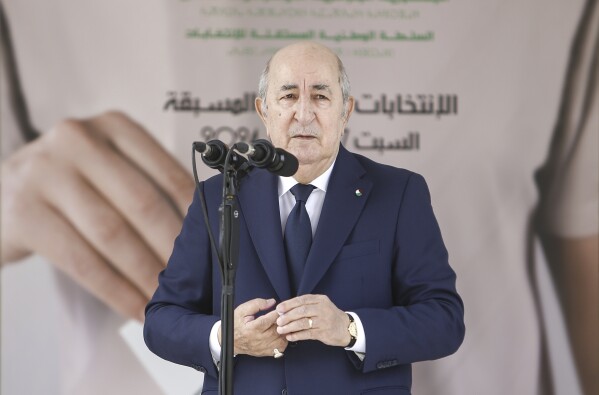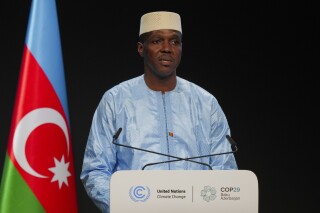ALGIERS, Sept 8 (NNN-AGENCIES) — Algerians voted Saturday in an election to decide whether army-backed President Abdelmadjid Tebboune gets another term in office — five years after pro-democracy protests prompted the military to oust the previous president after two decades in power.
There is little suspense about the result with Tebboune expected to win easily. The question is more about how many voters cast ballots.
Tebboune said after voting that he hoped “whoever wins will continue on the path towards a point of no return in the construction of democracy.”
Polls closed late Saturday and vote counting was underway as Algerians awaited an announcement of the results. The country’s election authority at 12:10 a.m. said that vote counting to so far suggested voter turnout was 48% in Algeria and 19.6% for precincts abroad — outpacing the country’s 2019 presidential election, where 39.9% of voters turned out to vote.
It’s unclear whether Tebboune will consider such a figure a triumph. In the lead-up to Saturday, his backers and rivals all urged Algerians to come out and vote after boycotts and high abstention rates in previous elections marred the government’s ability to claim popular support.
Algeria is Africa’s largest country by area and, with almost 45 million people, it’s the continent’s second most populous after South Africa to hold presidential elections in 2024 — a year in which more than 50 elections are being held worldwide, encompassing more than half the world’s population.
“Uncle Tebboune,” as his campaign called the 78-year-old, was elected in December 2019 after nearly a year of weekly “Hirak” demonstrations demanding the resignation of former President Abdelaziz Bouteflika. Their demands were met when Bouteflika resigned and was replaced by an interim government of his former allies, which called for elections later in the year.
Protesters opposed holding elections so soon, fearing the candidates running that year were close to the old regime and would derail dreams of a civilian-led, non-military state. Tebboune, a former prime minister seen as close to the military, won. But his victory was stained by boycotts and election day tumult.
Throughout his tenure, Tebboune has used oil and gas revenue to boost some social benefits — including unemployment insurance as well as public wages and pensions — to calm discontent. To cement his legitimacy, Tebboune hopes more of the country’s 24 million eligible voters participate in Saturday’s election than in his first election when only 39.9% voted.
Twenty-six candidates submitted preliminary paperwork to run in the election, although only two were ultimately approved to challenge Tebboune.
Abdelali Hassani Cherif, a 57-year-old head of the Islamist party Movement of Society for Peace, made populist appeals to Algerian youth, running on the slogan “Opportunity!” Youcef Aouchiche, a 41-year-old former journalist running with the Socialist Forces Front, or FFS, campaigned on a “vision for tomorrow.”
Andrew Farrand, the Middle East and North Africa director at the geopolitical risk consultancy Horizon Engage, said both challengers were looking more at the 2025 legislative elections than this 2024 presidential contest. Because Algerian law funds political parties based on the number of seats they win in legislative elections, they hope campaigning now positions them for a strong 2025 performance. — NNN-AGENCIES




